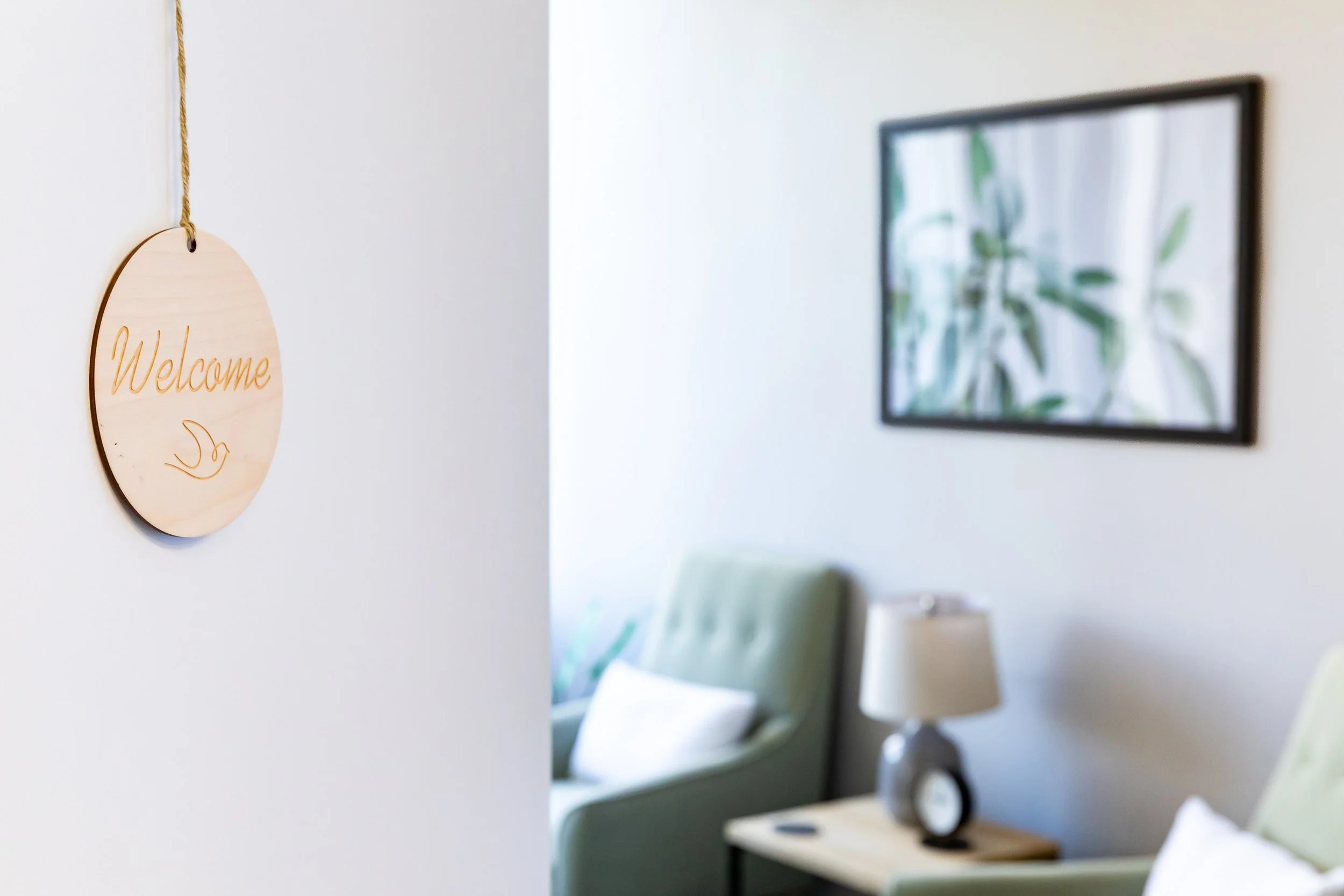What to Expect in your first therapy session
Starting therapy is a courageous step and your first time meeting a new therapist can feel daunting. Whether you’re experiencing anxiety, curiosity, or skepticism, it’s completely normal to have questions about what your first session will be like. At Aspire Psychology, we know how important it is to feel safe, seen, and supported—especially at the beginning of your healing journey.
Here’s what you can expect when you attend your first individual therapy session with us.
A Warm Personal Welcome
From the moment you arrive—whether it’s in person or via telehealth—your therapist will greet you with kindness and respect. The first session is a time for introductions, building rapport or a sense of trust, and beginning to understand your goals, challenges, and hopes for therapy. There’s no pressure to share everything right away. You set the pace.
“In our first appointment, we’ll explore the concerns that brought you to therapy and begin to understand what you’re hoping to change and what support you need in your life. I’ll ask questions about different areas of your experience to get a holistic view of who you are—not just what's challenging right now. This session is also a chance for you to get a feel for how I work and whether my approach and training align with your needs. Most importantly, we’ll begin identifying your goals and shaping a path forward together, at a pace that feels right for you.”
Some Paperwork, Some Conversation
Your initial therapy appointment includes some paperwork and conversation. Your therapist will go over:
Informed consent to treat
Confidentiality and privacy
Aspire’s scheduling and cancellation policies
Insurance or payment questions
Your therapist will review a few logistical items with you at the start— like what it means to consent to treatment, the importance of confidentiality and what that looks like in a therapy context, and Aspire’s cancellation and communication policies. These steps help lay a clear foundation for a collaborative and professional relationship. Your therapist can also answer any questions you have about Aspire, our policies or procedures, and how we work with insurance for payment.
Then, the real work begins—This is not about “fixing” you, but creating a space for curious conversation. Your therapist will ask questions about what brought you in, your history, your support system, and what you’d like to get out of therapy. You’re welcome to share as much or as little as you feel comfortable. An important part of this first session is to give both you and the therapist the chance to see if you're a good fit for each other to work together.
“The initial session is one of my favorite parts of the therapeutic process—second only to witnessing my patients' growth over time. It is a chance for us to build connection.I know opening up can feeling intimidating.That's why my goal is always to create a sense of trust and ease.”
-Magdalene Kidd Vasconez, LCSW
A Space That’s Truly Yours
Your therapist’s role is not to judge or dictate—but to hold space for your experience with empathy and curiosity. You can expect a confidential, nonjudgmental environment where you can explore your thoughts, emotions, and patterns at your own rhythm.
It’s also okay to say:
“I don’t know where to start.”
“This is hard to talk about.”
“I’m not sure what I need yet.”
This is your journey. Your therapist is there to walk beside you—not to lead you down their path, but to support you as you find your own.
“ Primarily, the first therapy session is an opportunity for us to get to know each other. It is the beginning of a conversation in a space that feels thoughtful, supportive and focused on what is most meaningful to you.While understanding your priorities in seeking care is paramount, an equally important task is for you and I to assess a “goodness of fit”.There is no pressure to figure everything out in that first session, and hopefully you will leave feeling heard, supported and connected. My favorite pieces of the intake are helping people feel more grounded in starting the process and to feel the possibilities that therapy can bring into their life.”
Common Questions
“Do I have to talk about everything in the first session?”
Not at all. Your story can unfold over time. There’s no expectation to cover it all at once.
“What if I cry or feel overwhelmed?”
You’re allowed to show up exactly as you are. Therapy is a space where your feelings are not only welcome—they’re honored. It’s not uncommon to feel a wave of emotions during your first session—relief, sadness, hope, hesitation. All of it is valid. You may find that simply being heard—sometimes for the first time in a long while—can be deeply healing.
“Is there anything I can do to feel more prepared?”
There is nothing you need to do ahead of time but we know it can be intimidating to go into something new without a plan. You can bring a list of questions you have for your therapist, a list of goals you would like to achieve, or a couple of bullet points of big events in your life that you want to make sure to talk about. Your therapist will help direct the conversation for that first session but your thoughts and input are welcome at every step of the process!
“How will I know if it’s a good fit?”
A strong therapeutic relationship is key to healing. Finding the right therapist is a bit like dating—it can take time, and it's okay if the first one you meet isn't "the one." A strong therapeutic relationship is one of the most important factors in whether therapy is effective. Here’s what to look for:
You Feel Safe and Respected. You should feel emotionally safe in your therapist's presence. That means feeling heard, not judged, and able to share without fear of dismissal or shame. Respect for your identity, boundaries, and pace is essential.
They Understand or Are Willing to Learn About Your Identity and Experiences. This is especially important for clients who hold marginalized or systemically excluded identities—such as those who are Black, Indigenous, people of color, LGBTQIA+, neurodivergent, disabled, or part of other historically underrepresented communities. A culturally responsive therapist demonstrates ongoing cultural humility, accountability, and a commitment to growth and learning.
You Don’t Feel Rushed or Dismissed. Your therapist should give you space to talk and explore at your own pace. If they frequently interrupt, seem distracted, or try to "fix" things quickly without understanding, it may not be a good fit.
You Feel Like They Get You (Or Want To). Therapists don’t need to have all the same life experiences as you, but you should feel like they are trying to understand what it's like to be you—and that they actually care.
Their Style Matches What You’re Looking For. Some people want a more structured, solution-focused approach (like CBT), while others prefer open-ended exploration or somatic, trauma-informed work. Our therapists are trained in more than one approach and will integrate those that are best for you. Ask about their approach in the first session or two. It's okay to ask for something different.
You Feel Some Relief or Insight, Even Early On. While therapy can take time to “work,” many people feel a sense of relief after a few sessions with the right therapist—whether it’s from being truly heard or gaining a new perspective.If you feel a sense of calm, clarity, or even just “okay-ness” after sessions, that’s valuable information.
It’s Okay to Talk About the Relationship. A good therapist is open to feedback. If something doesn’t feel right, and they respond with curiosity and compassion instead of defensiveness, that's a good sign. If you're not sure, talk about it. A good therapist will support your exploration of whether the fit feels right.
You’re Not Alone
Aspire Psychology is built around the belief that healing happens in relationship—with ourselves and with others. While you’ll be working one-on-one with your therapist, you’re also supported by a whole team committed to compassionate, client-centered care.
Whether you’re navigating anxiety, grief, trauma, life transitions, relationship issues, or simply feeling “stuck,” therapy can be a powerful space for change, insight, and growth.
Ready to Begin?
If you're considering therapy, we’d be honored to support you. Make an Appointment now to get started or contact us today if you have questions.

